Football Helmet–Inspired 2025 Nissan Kicks Is The Best New Nissan Design In Years

Truly small new cars are a rarity in the U.S., even those marketed as crossovers, and the ones that still exist typically have designs that are either boring and forgettable or ugly and chintzy. The first-generation Nissan Kicks fell into the former category; the subcompact crossover was handsome but nothing to write home about. Nissan is remedying that with the second-gen 2025 Kicks, which is easily the best new Nissan design in years.
Despite the Qashqai still existing in Europe (and the current third-gen model looking great), we aren’t getting it as the Rogue Sport in the U.S. anymore, so the new Kicks has grown to fill its spot in the lineup. Compared to the old Kicks, the new one is 2.3 inches longer, 1.6 inches wider and 0.9 inch taller, and its wheelbase has been stretched by nearly 2 inches. It’s slightly smaller in each dimension than the Rogue Sport was, and despite the growth in size the 2025 Kicks is still pretty tiny.
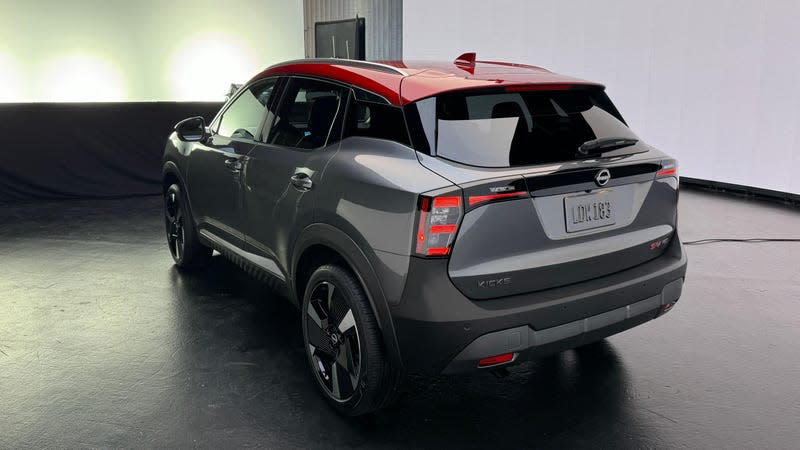
The 2025 Kicks rides on an updated version of the old car’s platform, but the engine is all new. Its naturally aspirated 2.0-liter inline-4 makes 141 horsepower and 140 pound-feet of torque, increases of 19 hp and 26 lb-ft over the previous model’s 1.6-liter four. A continuously variable transmission (CVT) remains the only option. All-wheel drive is now available for the first time on the Kicks, and the system includes a Snow driving mode. Along with the growth in size, the new Kicks is around 300 pounds heavier than the old model, with AWD adding another couple hundred pounds. Nissan hasn’t announced performance figures, but it should be quicker to accelerate despite the additional mass. Regardless of drivetrain the Kicks’ ground clearance has grown by 1.4 inches to 8.4 inches, which Nissan says is the best in the segment.
Okay, that’s the boring (but important) stuff out of the way. Y’all, the new Kicks looks good. Like, so good that when I walked into the studio it made me stop in my tracks and smile. Lots of brands use boxy designs to convey toughness, but Senior Design Director Ken Lee wanted to go in a fresher direction and create something new. Lee says the design team went through a bunch of proposals, eventually landing on this one that was inspired by football helmets and sneakers. The result is cute without being cheesy, butch without being aggressive. It reminds me of Nissan’s early-2000s concept cars, in my opinion the brand’s golden era of design.
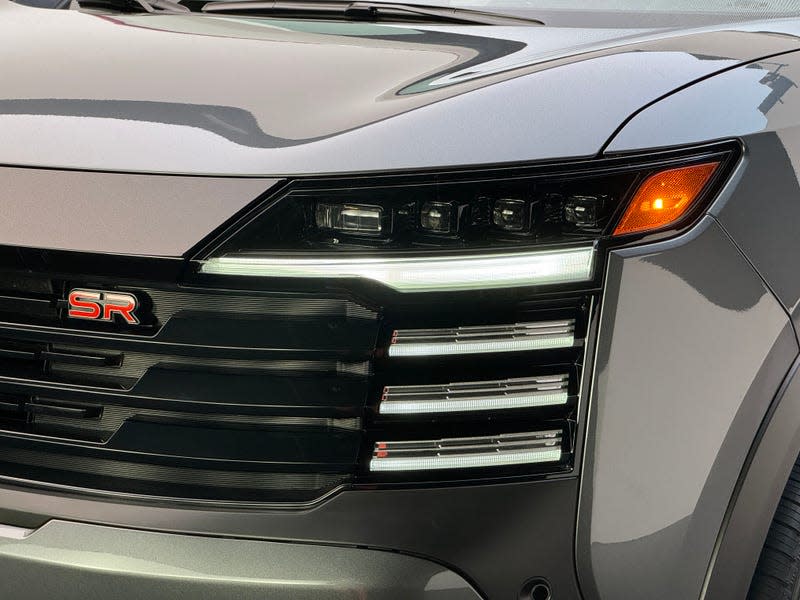
The new Kicks has a prominent, blocky face with trapezoidal LED headlights and a ribbed grille made from glossy black plastic. Top-end SR models have cool segmented LED running lights that are set into the 3D ribs beneath the headlights, which Lee says is meant to look like a football player’s face paint; the base S and mid-range SV get chrome trim in the same spot. Matte black plastic sections connect the headlight and grille surrounds to other sections of the bumper and the wheel arches, and the hood is nicely sculpted, taller at the edges to give the effect of shoulder pads.
In what Lee calls a return to simplicity, the Kicks has a single horizontal character line runs along the shoulder of the car, from the headlight corner all the way to the rear end. The fenders are a lot wider and more flared than you’d expect, especially above the rear wheel, and while the greenhouse is upright the rear glass has some steep rake to it. In a surprising move for a car of this size, there’s an actual quarter window in the C-pillar that increases visibility by a not-insignificant amount and lets more light in, and the shoulder line kicks up to meet the window. The LED taillights have a similar three-bar motif to the headlights, with a gloss black trim piece running across the taillights and matte black connecting them to the rear bumper and wheel arches.
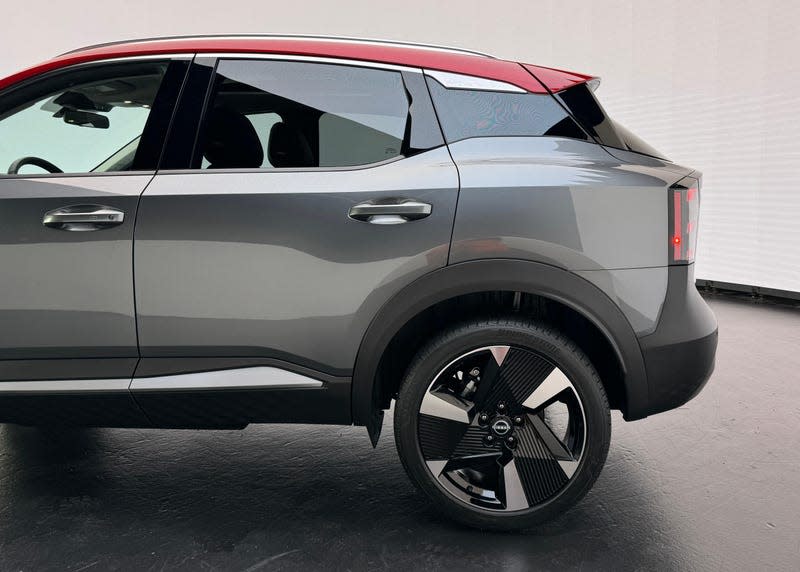
There are a ton of really cool details. The black plastic side skirts and underside of the front bumper feature a three-dimensional diamond pattern that’s like the foam outsole of a sporty shoe, and it adds a lot of visual flair to a typically boring part of a car. There’s a small “Kicks” script stamped into the side mirror arms, and the quarter windows have clever etching that reveals the Kicks name in the sheet metal. And I’d be remiss not to mention the incredible three-spoke 19-inch wheels that the SR gets, which are 2 inches bigger than the previous biggest wheel option. Red, silver or black contrasting roofs will be available depending on the trim and main paint color.
The interior has similarly gone a lot more premium, at least when looking at the top-of-the-line SR trim. Nissan says it wants the new Kicks to be a core model for the brand, so it brought features that are typically reserved for segments above. Whereas the exterior is like a helmet’s hard shell, the interior is meant to feel padded and comfortable like the lining of the helmet. Materials in areas like the door panels and upper dashboard are more plush than is typical of this segment — I even don’t hate the carbon-fiber-look woven fabric trim. The SR trim gets great red and gray contrasting stitching and a really cool pattern for the fabric seat centers that Nissan expects to be very popular.

A dual-screen setup comes standard, with two 7-inch displays on the base S and 12.3-inch units used on the other trims that are well integrated into the design of the dash. The SV and SR have wireless Apple CarPlay and Android Auto, and depending on trim you can have up to four USB-C ports, a wireless charging pad and satellite radio. A 10-speaker Bose sound system with speakers in both front headrests is optional on the SR. There’s a physical volume knob in between the center air vents, and the SR has a row of touch controls for the automatic climate control below that. Nissan increased the amount of storage space in the center console, and the cupholders are big enough for a 30-ounce tumbler.
The new Kicks has Nissan’s Zero Gravity seats in both rows, and while headroom and legroom for front passengers is slightly down, rear passengers have more space in almost every dimension. From my perspective the driving position seems better, and the rear seat feels comfortable for my 5’9” self. Cargo space has been improved to be best in class, with the front-drive Kicks S offering 30 cubic feet of room with both rows of seats up and 60 cubic feet with the second row folded, increases of 4.7 and 27.7 cubes respectively. (The SV and SR have less room, as do AWD models, but overall space is still better than the old Kicks.) Nissan says the cargo area is wide enough to accommodate a stroller or golf bag, the liftover height is lower, and the flat floor has a storage compartment underneath.

An optional panoramic sunroof (that actually opens!) is a rarity in this segment, and it makes the Kicks’ cabin feel a lot airier. Other available features include a 360-degree camera system, ambient interior lighting, heated front seats, a heated steering wheel, rain-sensing wipers and remote start. Every Kicks comes with adaptive cruise control, automated emergency braking with pedestrian detection, automatic high beams, blind spot monitoring, lane departure warning, rear automated braking and rear cross-traffic alert. The SR adds blind spot intervention, emergency lane keeping assist, lane departure prevention, front parking assist, traffic sign recognition and Nissan’s ProPilot Assist highway driving system.
Nissan has yet to announce how much money the 2025 Kicks will cost, only saying that it will go on sale later this year. It’s sure to carry a price premium of at least a grand or two over the 2024 model’s $22,440 starting price, with a fully loaded SR likely to get close to the $30k mark. Even if that’s the case, the new Kicks will remain a great value in the subcompact SUV segment, and its excellent design should make it even more appealing to a wider range of customers.
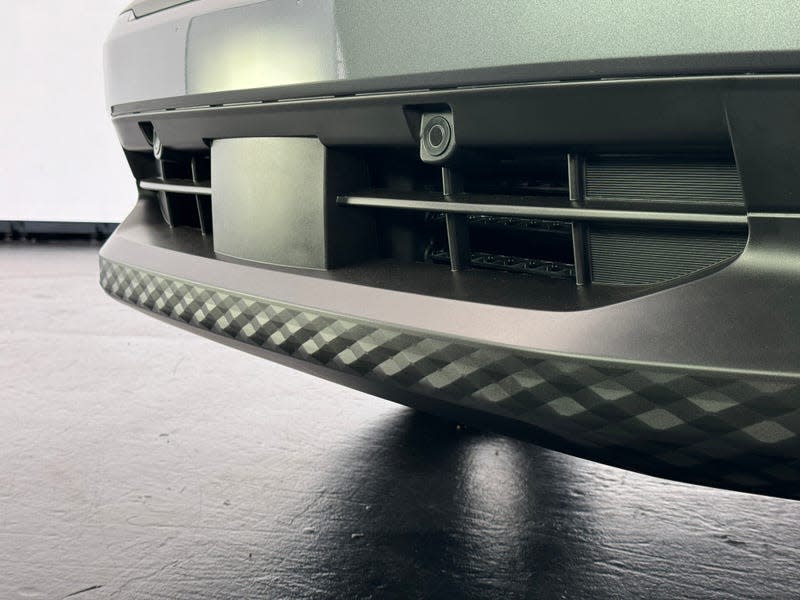


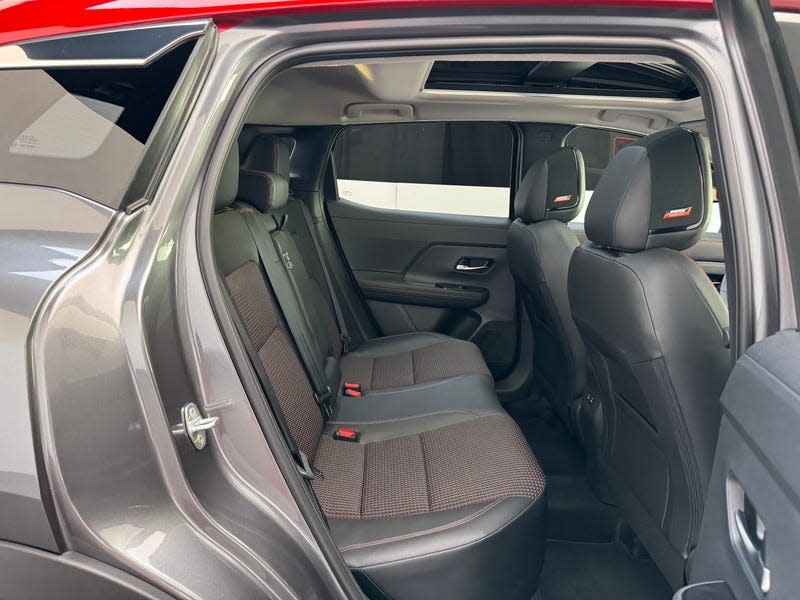


 Yahoo Autos
Yahoo Autos 